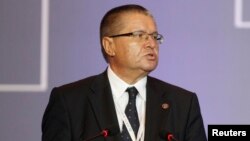Russia is likely to penalize Ukrainian imports starting in January after European Union-brokered talks failed to find a compromise Tuesday, exactly a month before the launch of an EU-Ukraine free-trade pact that Russia opposes.
"It is a very probable scenario that there will not be an agreement before January 1 and the nonpreferential trade regime will be introduced," Russian Economy Minister Alexei Ulyukayev told reporters after the talks in Brussels, saying that existing preferential treatment of Ukrainian imports would probably end.
After the latest negotiations, the three parties agreed to keep talking. But time is running out before Ukraine, Georgia, Moldova and the European Union drop mutual trade barriers under a deal that has been at the root of wider confrontation with Moscow.
"The clock is ticking very, very fast," EU Trade Commissioner Cecilia Malmstrom said after hosting the meeting. She stressed that Ukraine and the European Union would not heed Russian calls for them to amend their agreement or, following more than a year's delay, put off its implementation any longer.
"On January 1, the DCFTA [Deep and Comprehensive Free Trade Area] will enter into force," she said, adding she was willing to continue trying to address Russian concerns into the new year, but only if Moscow did not take retaliatory measures.
Ukrainian Foreign Minister Pavlo Klimkin criticized Russian negotiators for delivering new demands Tuesday, some of which he said were "unacceptable."
The Ukrainian government says that two years of conflict with Moscow, initially triggered by Kiev's trade negotiations with its Western neighbours, have already run down Ukraine's exports to its former Soviet partner, reducing the impact of sanctions in the form of a loss of favored-nation status.
Malmstrom told reporters that technical teams from the three parties could meet again as early as next week, and she spoke of a willingness to look seriously at issues Russia has raised, including veterinary standards and customs data sharing.
But she noted the trade dispute was part of a broader political confrontation between Moscow and Western powers and said it was not clear that the political will to resolve it existed.
Ukrainian wavering over whether to sign the EU trade accord in late 2013 fueled protests that toppled the pro-Moscow President Viktor Yanukovich, leading to Russia's annexation of Crimea and a revolt by pro-Russia separatists in the east.
Russia opposes the DCFTA, saying it could lead to a flood of European imports across its own borders and damage the competitiveness of Russian exports to Ukraine.




